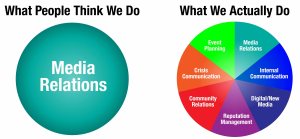Sometime last year, I read and participated in a discussion on LinkedIn that essentially asked the question, whether or not journalists were better public relations practitioners than public relations specialists. The truth is, there is a quiet battle that’s been waging for some time now in the world of public relations – that is, the Journalist vs. the P.R. Practitioner.
By that, I am referring to attitudes about individuals who migrated to the public relations field from the journalism world versus those who entered the field having gotten a degree specifically in public relations. And that attitude is essentially that the journalists are far more effective public relations practitioners than the individual who didn’t major in or hone their skills in the journalism world. It seems that for some, public relations as a specific degree and focus is almost useless for successfully practicing in the field.
This attitude and belief is not particularly surprising. The fact is, Journalism often falls under the same umbrella of Communications that Public Relations does. And the reality is that the two fields do share some very significant elements. Such as, writing and research skills, active listening, reasoning and deductive skills. That said, it is my belief that the key reason this notion not only exists, but for some pervades, is due to the idea that public relations is essentially media relations. The image posted at the start of this blog entry, speaks directly to the heart of this.
And that belief helps breed the attitude of who better than someone who has worked in the media, developed connections and relationships with other journalists, to do the job. However, in my opinion, the notion that public relations equals media relations is a myth. Yes, by all means it is a very significant part of it but public relations is so much more than that. It also involves internal communications, employee engagement, crisis communication, digital and new media, event planning, corporate social responsibility and more. All of these elements play a significant role in public relations’ core purpose of “building mutually beneficial relationships between an organization and its publics.” And a successful public relations practitioner, while not necessarily an expert in all, should know and truly understand all these different elements.
Two, while writing is without question essential to any communication field, including, Journalism and Public Relations, and both fields swear by the bible of AP styling, the fact is there are specific rules and styling elements that go into the different types of documents specific to the field. Many know about the press release of course but public relations also involves knowing how to write an effective newsletter, annual report, speeches, crisis communication plan, strategic communication plan, employee memo, visual presentations and more. All of these require knowledge, skills and rules specific to each document.
Finally, public relations often involves the creation of entire strategies for achieving a specific goal and objectives. A client rarely ever hires a firm/practitioner to merely send out press releases about its company and products or to only pitch a story or two. Rather, firms and public relations practitioners are hired to come up with strategies to address specific issues – that may be a recent crisis and restoring the organization’s reputation; launching a new product and/or program; helping to improve internal communications and/or employee engagement at the organization; identifying and reaching new publics for the organization, etc. All of these require more than just sending out a press release or putting together a media pitch. Instead, it involves the construction of a well-planned, well-researched and detailed strategy, which includes key goals, objectives, tactics, measurement indicators and more.
Let me be very clear that I don’t think this is an attitude shared by all former journalists in the public relations industry. Also, I am certain that former journalists are more than capable of learning and excelling at the many different elements of the field that I just stated. I am also not suggesting that no one but a public relations major is capable of succeeding in this field and mastering these elements. During my time at a global strategic communications firm, I met individuals who had been History majors, English (this of course makes a lot of sense, particularly for all the writing done in public relations), Psychology, Philosophy, Foreign Languages, Math & Science and more. And I absolutely believe that if I had decided to pursue employment in the journalism world, despite having a degree in Public Relations, I would have been more than capable of learning the tools and elements necessary, and with enough hard work, develop into a credible journalist.
However, I certainly would not have walked into it feeling like I was somehow better capable and more equipped than those who had majored and studied and trained in the field, simply because it employed some of the same elements as public relations. And that is ultimately my “gripe” if you will – the notion that journalists, by virtue of being journalists, are far more capable and better equipped at public relations than those who not only studied but trained specifically in the field.
It is the notion that a public relations degree is all but useless and meaningless and that the real public relations experts are journalists. My hope is simply to not feel like all of the hard work I and others like myself have done in training and honing our craft is dismissed by virtue of never having been a journalist. That all of the work we do is not dismissed and labeled solely into one box – that is, media relations.
